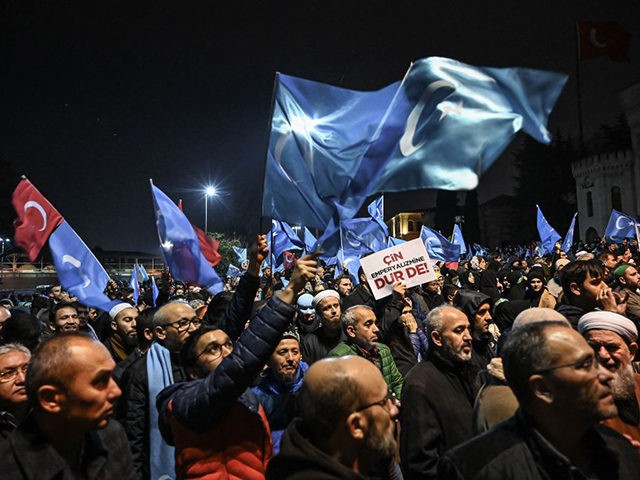Human-rights watchdog Bitter Winter published an interview Sunday with a garment factory manager in China’s Xinjiang province who said the thousand or so Uyghur Muslims who work for his operation are used as slave laborers, despite the regime’s assurances that work programs in the province are a benefit to local participants.
Bitter Winter’s correspondent is a Han Chinese man who was interviewed using the pseudonym “Wang Hao.” Wang said his Uyghur workers are forced to take a military-style run every morning before working 13-hour days for wages of roughly $70 a month in U.S. currency.
Wang said workers at his factory live on the premises and are “rarely allowed to return home during their days off.”
Work requirements in Xinjiang force women and even minor children to work at these grueling jobs, with the children sometimes delivered to factories by work programs at their schools. Worse still, Wang confirmed dark rumors that Uyghurs imprisoned in Chinese camps where they supposedly experience “transformation through education” are forced to work without any compensation at all.
“The government calls these camps ‘education training classes,’ but they are jails, where detainees must work most of the time,” Wang said.
“What the state wants is not to lessen poverty, but to transform Uyghurs’ ideology,” he said, contradicting the official Chinese Communist Party (CCP) narrative of happy Uyghurs graduating from “vocational training” and eagerly taking jobs provided by anti-poverty programs.
“They suppress their faith by banning their customs, traditional clothing, religious festivals, or praying in mosques. Uyghurs are forced to eat pork and only allowed to believe in one religion: the Chinese Communist Party,” he said.
According to Wang, these purported “anti-poverty programs” are making poverty significantly worse in Xinjiang because forced labor and low wages have left the Uyghurs making about ten cents on the dollar compared to the wages they once earned when allowed to work outside the province.
“The government has summoned most of them back to Xinjiang and restricts their movements. They can only leave after receiving permission, and only if no one in their families’ three generations has a police record,” he said of the Uyghurs’ situation today.
“As a Han person, I agree with all the claims that there are no human rights in Xinjiang,” Wang concluded, stressing his ethnicity to show that many Han Chinese disagree with how their government is treating the Uyghurs.
Rahima Mahmut, UK-based spokeswoman for the World Uyghur Congress, said during a panel discussion last week that China’s persecution of the Uyghurs has become a “more genocidal policy” since mass arrests began filling the concentration camps in 2017.
Mahmut said surveillance of the Uyghurs has been increased to keep their stories from reaching the outside world.
“We learned that anyone who receives a foreign call, whether on their landline or their mobile phone, police will arrive in five or ten minutes. And voice recognition technology — the Chinese have recorded the voice of all dissidents, so they have a very sophisticated hi-tech surveillance in place,” she said.
“Everyone knows, it is an open secret, that we are broadly dependent on enslaved labor. If we do not seize this moment to protest, we become complicit,” writer Maajid Nawaz said at the same panel of the labor practices.
Last week, the U.S. government added 11 more Chinese companies to its sanctioned entity list for involvement in the oppression and exploitation of the Uyghurs, bringing the total number of entries to 48. Nine of the new companies were allegedly involved in using Uyghurs as forced labor, while the other two participated in the surveillance system Beijing has imposed on Xinjiang province.
The U.S. has also sanctioned several senior Chinese officials for presiding over “horrific and systematic abuses” against the Uyghurs, including the Communist Party secretary of Xinjiang, Chen Quanguo.

COMMENTS
Please let us know if you're having issues with commenting.